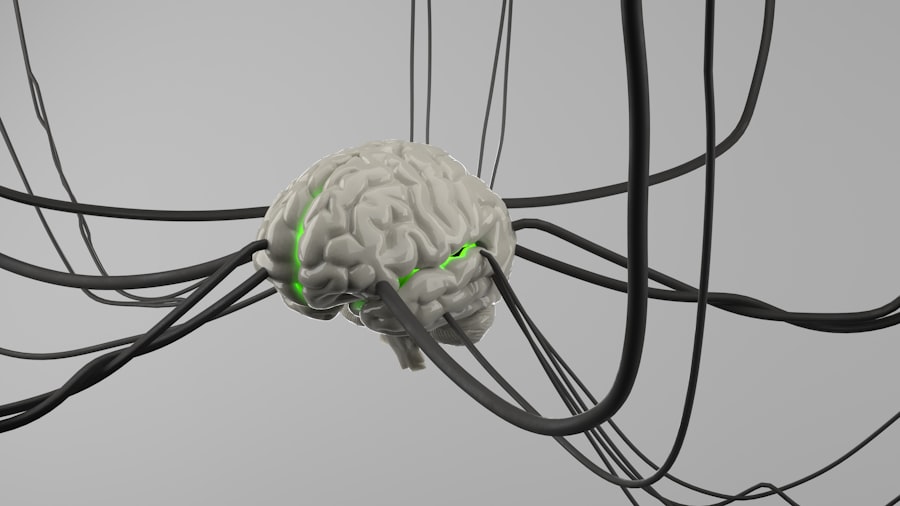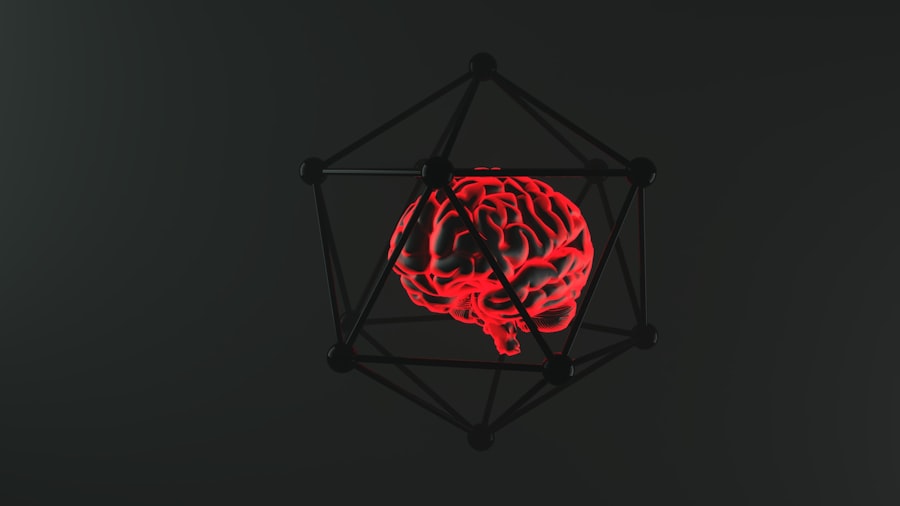The brain-mind connection is a fascinating and complex relationship that has intrigued scientists, philosophers, and everyday individuals alike. At its core, this connection refers to the interplay between the physical structure of the brain and the intangible aspects of the mind, including thoughts, emotions, and consciousness. You may often find yourself pondering how your mental state can influence your physical well-being and vice versa.
This intricate relationship suggests that your brain is not merely a biological organ but also a central player in shaping your experiences, perceptions, and overall reality. Understanding this connection requires delving into both neuroscience and psychology. The brain, composed of billions of neurons communicating through electrical impulses and chemical signals, serves as the hardware of your mental processes.
Meanwhile, the mind encompasses your thoughts, feelings, and beliefs—elements that are less tangible but equally significant. By exploring how these two realms interact, you can gain insights into your own behavior and emotional responses, ultimately leading to a deeper understanding of yourself and your experiences.
Key Takeaways
- The brain-mind connection refers to the relationship between the physical brain and the mind, encompassing thoughts, emotions, and consciousness.
- Neurotransmitters play a crucial role in the brain-mind link, affecting mood, behavior, and cognitive function.
- Emotions have a significant impact on the brain-mind connection, influencing perception, decision-making, and overall mental well-being.
- Thoughts and beliefs can shape the brain-mind link, affecting neural pathways and cognitive processes.
- Neuroplasticity is essential for strengthening the brain-mind connection, allowing the brain to adapt and reorganize in response to new experiences and learning.
The Role of Neurotransmitters in the Brain-Mind Link
Neurotransmitters are the chemical messengers that facilitate communication between neurons in your brain. They play a crucial role in the brain-mind connection by influencing mood, cognition, and behavior. For instance, serotonin is often referred to as the “feel-good” neurotransmitter because it contributes to feelings of happiness and well-being.
When you experience joy or contentment, it is often due to the release of serotonin in your brain. Conversely, imbalances in neurotransmitter levels can lead to mood disorders such as depression or anxiety, highlighting the profound impact these chemicals have on your mental state. Dopamine is another key player in this intricate relationship.
It is associated with pleasure, reward, and motivation. When you achieve a goal or experience something enjoyable, dopamine is released, reinforcing positive behaviors and encouraging you to seek out similar experiences in the future. Understanding how neurotransmitters function can empower you to make choices that promote a healthier brain-mind connection.
By engaging in activities that boost serotonin and dopamine levels—such as exercise, socializing, or pursuing hobbies—you can enhance your overall mental well-being.
How Emotions Impact the Brain-Mind Connection

Emotions are powerful forces that shape your experiences and influence your mental state. They are not just fleeting feelings; they are deeply rooted in your brain’s structure and function. When you experience an emotion, such as joy or sadness, specific areas of your brain become activated.
For example, the amygdala plays a crucial role in processing emotions like fear and pleasure, while the prefrontal cortex is involved in regulating emotional responses and decision-making. This interplay between different brain regions illustrates how emotions can significantly impact your thoughts and behaviors. Moreover, your emotional state can create a feedback loop that further strengthens the brain-mind connection.
When you feel happy or fulfilled, you are more likely to think positively and engage in constructive behaviors. Conversely, negative emotions can lead to a cycle of self-doubt and pessimism. By recognizing this dynamic, you can take proactive steps to cultivate positive emotions through practices such as gratitude journaling or engaging in activities that bring you joy.
In doing so, you not only enhance your emotional well-being but also strengthen the overall connection between your brain and mind.
The Influence of Thoughts and Beliefs on the Brain-Mind Link
| Factors | Impact on Brain-Mind Link |
|---|---|
| Positive Thoughts | Can improve mood, reduce stress, and enhance overall well-being |
| Negative Beliefs | May lead to anxiety, depression, and negative self-perception |
| Self-affirmation | Can boost self-esteem and confidence, leading to better cognitive function |
| Mindfulness Practices | Help in reducing rumination and improving attention and emotional regulation |
Your thoughts and beliefs are powerful determinants of your mental landscape. They shape how you perceive the world around you and influence your emotional responses. Cognitive psychology emphasizes the idea that your thoughts can directly impact your feelings and behaviors.
For instance, if you hold a belief that you are capable and resilient, you are more likely to approach challenges with confidence and determination. On the other hand, negative self-talk or limiting beliefs can hinder your progress and contribute to feelings of inadequacy. Neuroscience supports this notion by demonstrating that repeated thought patterns can lead to changes in brain structure and function.
When you consistently engage in positive thinking or affirmations, neural pathways associated with those thoughts become stronger over time. This phenomenon underscores the importance of cultivating a positive mindset to enhance the brain-mind connection.
The Importance of Neuroplasticity in Strengthening the Brain-Mind Connection
Neuroplasticity refers to the brain’s remarkable ability to adapt and reorganize itself throughout life. This capacity for change is fundamental to strengthening the brain-mind connection. When you learn new skills or engage in novel experiences, your brain forms new neural connections, enhancing its overall functionality.
This adaptability means that regardless of age or past experiences, you have the potential to reshape your brain’s structure through intentional practice and learning. Embracing neuroplasticity allows you to take an active role in enhancing your mental well-being. For example, if you want to improve your focus or emotional regulation, engaging in mindfulness practices or cognitive training exercises can lead to lasting changes in your brain’s wiring.
The Impact of Stress on the Brain-Mind Link

Stress is an inevitable part of life, but its impact on the brain-mind connection can be profound. When faced with stressors, your body releases hormones like cortisol that prepare you for a fight-or-flight response. While this reaction can be beneficial in short bursts, chronic stress can lead to detrimental effects on both your brain function and mental health.
Prolonged exposure to stress hormones can impair cognitive functions such as memory and decision-making while also contributing to anxiety and depression. Recognizing the impact of stress on your mental state is crucial for maintaining a healthy brain-mind connection. Implementing stress management techniques—such as deep breathing exercises, physical activity, or engaging in hobbies—can help mitigate these effects.
By prioritizing self-care and finding healthy outlets for stress relief, you can protect your mental well-being while fostering a more resilient connection between your brain and mind.
The Role of Meditation and Mindfulness in Enhancing the Brain-Mind Connection
Meditation and mindfulness practices have gained popularity for their ability to enhance mental clarity and emotional well-being. These practices encourage you to cultivate present-moment awareness while fostering a non-judgmental attitude toward your thoughts and feelings. Research has shown that regular meditation can lead to structural changes in the brain, particularly in areas associated with emotional regulation and self-awareness.
By incorporating meditation into your daily routine, you can strengthen the brain-mind connection significantly. Mindfulness practices help reduce stress levels while promoting emotional resilience. As you become more attuned to your thoughts and feelings through meditation, you may find it easier to navigate challenges with a sense of calmness and clarity.
This enhanced awareness not only benefits your mental health but also fosters a deeper understanding of yourself and your experiences.
The Connection Between Physical Health and the Brain-Mind Link
Your physical health plays an integral role in shaping the brain-mind connection. The mind-body relationship is well-documented; when you prioritize physical well-being through regular exercise, proper nutrition, and adequate sleep, you create a solid foundation for optimal mental health. Exercise releases endorphins—natural mood lifters—that enhance feelings of happiness while also improving cognitive function.
Moreover, nutrition significantly impacts brain health by providing essential nutrients that support neurotransmitter production and overall cognitive function. A balanced diet rich in omega-3 fatty acids, antioxidants, vitamins, and minerals can promote optimal brain function while reducing the risk of mental health disorders. By recognizing the interconnectedness of physical health and mental well-being, you can take proactive steps toward nurturing both aspects of yourself.
The Influence of Social Relationships on the Brain-Mind Connection
Social relationships play a pivotal role in shaping your mental landscape. Human beings are inherently social creatures; our connections with others significantly influence our emotional well-being and cognitive function. Positive social interactions release oxytocin—a hormone associated with bonding—that fosters feelings of trust and connection while reducing stress levels.
Conversely, social isolation or negative relationships can have detrimental effects on mental health. Loneliness has been linked to increased risks of anxiety and depression while impairing cognitive function over time. By nurturing meaningful relationships with friends, family, or community members, you not only enhance your emotional well-being but also strengthen the brain-mind connection through shared experiences and support.
The Role of Nutrition in Supporting the Brain-Mind Link
Nutrition is a cornerstone of maintaining a healthy brain-mind connection. The foods you consume provide essential nutrients that support optimal brain function while influencing mood regulation and cognitive performance. For instance, omega-3 fatty acids found in fatty fish have been shown to promote neurogenesis—the growth of new neurons—while also reducing inflammation associated with mood disorders.
Incorporating a variety of nutrient-dense foods into your diet can have profound effects on both physical health and mental well-being. Foods rich in antioxidants—such as berries—can protect against oxidative stress while promoting cognitive function. Additionally, maintaining stable blood sugar levels through balanced meals can help regulate mood swings and enhance focus throughout the day.
By prioritizing nutrition as part of your self-care routine, you can support both your physical health and mental clarity.
Strategies for Enhancing the Brain-Mind Connection in Everyday Life
Enhancing the brain-mind connection requires intentional effort and practice in daily life. One effective strategy is to cultivate mindfulness through simple practices such as deep breathing exercises or mindful walking. Taking moments throughout your day to pause and connect with your breath can help ground you while fostering awareness of your thoughts and emotions.
Additionally, engaging in lifelong learning—whether through reading books, taking courses, or exploring new hobbies—can stimulate neuroplasticity while enriching your mental landscape. Surrounding yourself with positive influences—whether through supportive relationships or uplifting media—can also contribute to a healthier brain-mind connection. Incorporating regular physical activity into your routine is another powerful way to enhance this connection.
Exercise not only boosts endorphin levels but also promotes better sleep quality—an essential component for optimal cognitive function. By prioritizing self-care practices that nurture both body and mind, you can create a harmonious balance that strengthens the intricate relationship between your brain and mind. In conclusion, understanding the multifaceted nature of the brain-mind connection empowers you to take charge of your mental well-being actively.
By recognizing how neurotransmitters influence emotions, how thoughts shape beliefs, and how lifestyle choices impact overall health, you can cultivate a more resilient mindset while fostering personal growth throughout life’s journey.
The intricate relationship between the brain and the mind has long fascinated scientists and philosophers alike, as they seek to unravel the mysteries of consciousness and cognitive function. A related article that delves into this fascinating topic can be found on Unplugged Psych, where the exploration of psychological concepts is a central theme. For more insights into the brain-mind connection, you can read the article on their website by following this link: Unplugged Psych. This resource offers a comprehensive look at how our mental processes are deeply intertwined with the physical structures of the brain, providing a deeper understanding of how we think, feel, and perceive the world around us.
FAQs
What is the brain-mind connection?
The brain-mind connection refers to the relationship between the physical brain and the mental processes, including thoughts, emotions, and consciousness.
How does the brain-mind connection work?
The brain-mind connection is complex and involves the interaction of neurons, neurotransmitters, and various brain regions to produce mental experiences and behaviors.
What are some examples of the brain-mind connection?
Examples of the brain-mind connection include the impact of brain injuries on cognitive function, the influence of neurotransmitters on mood and emotions, and the role of brain activity in decision-making and perception.
What are some factors that can influence the brain-mind connection?
Factors that can influence the brain-mind connection include genetics, environment, experiences, and lifestyle choices such as diet and exercise.
How can understanding the brain-mind connection benefit us?
Understanding the brain-mind connection can lead to advancements in mental health treatments, improved learning and memory strategies, and a better understanding of consciousness and human behavior.



